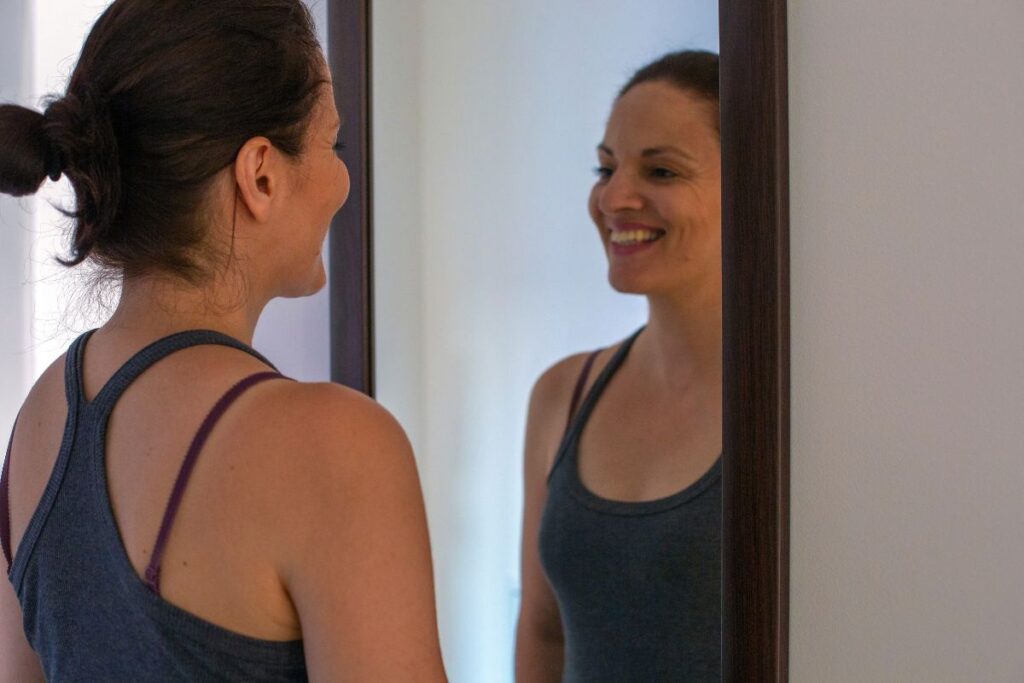Inside: Use these self-care ideas to reduce stress in your life and improve your well-being.
Let’s get real: Self-care is usually marketed as days spent lounging at the spa or hour-long skincare routines after soaking up in the bathtub for hours. While those things are fine, they aren’t always possible or even what you need most when you’re in a stressful season in your life.
Real self-care goes beyond facials and expensive creams. Yes, they can be a part of it, but looking after ourselves is more about small actions we do every day that ultimately add up and create a huge impact on our lives.
If you’re currently on the lookout for simple ways to start implementing self-care into your current schedule, here are a few self-care ideas to reduce stress in your life.

9 Self-Care Ideas to Reduce Stress in Your Life
Use these self-care ideas to reduce stress in your life and improve your well-being.
1. Declutter something
While you may not initially think of decluttering as a form of self-care, it very much can be! When you’re already feeling stressed, you don’t want to come home to a space that adds to your stress levels.
Studies have shown that for women especially, cortisol levels increase when in a cluttered space. You can’t always control every area of your life, but you can make changes in your home right away.
The goal is for your home to be your sanctuary from the world. Regain control over your environment by taking baby steps towards creating a space you love.
Decluttering can feel cathartic as well. It’s one of my favorite self-care ideas to reduce stress because you can immediately see and feel the results of your efforts.
If you’re not sure where to start, check out this post with high-impact areas you can declutter quickly.
Bonus tip: while decluttering the stuff in your home is important and helpful, don’t overlook decluttering other areas of your life as well. Reflect on your relationships and decide if any decluttering is needed. Also, consider your schedule if you’re feeling overcommitted.
2. Don’t be available all the time
These days, we’re reachable pretty much 24/7 thanks to smartphones. However, reachability isn’t the same as availability. It’s important to honor your needs and responsibilities without constant interruptions.
No, you don’t need to respond to that text right away. If you’re busy completing something, that call can definitely wait. You don’t need to turn off your phone completely but limit your notifications so that you can be more present!
Being available all of the time doesn’t relate just to technology either. If you’re a people pleaser, it’s especially important to create boundaries with your schedule and commitments. Get clear on what you do (and don’t) have the capacity for and don’t be afraid to say no to protect your time.

3. Be intentional with social media
These days, it has become pretty hard not to compare ourselves and our lives to what we see on social media. Be it someone’s perfectly-decorated home, flawless skin, or fairytale-like love stories, not falling into the comparison game with the accounts we follow is challenging.
Even though you may feel genuinely happy for them, if you find yourself having negative feelings about your life after browsing social media, it may be time to re-assess the content you’re consuming (even for just a while).
This can be especially important if you’re currently going through difficult times yourself.
Be more intentional with how you use social media. Take a hard look at who you should unfollow or unfriend. Make your mental well-being a priority. If you really don’t want to remove or unfollow someone, you can also snooze their content (they will never know you did!).
4. Write your feelings down
Jotting things down on paper can be a really powerful move. If you’re feeling down today, it may be a good idea to write exactly what emotions you’re going through without filtering anything out.
Not only will writing down what you’re going through help you feel better instantly, but it will also help you make better sense of the situation and, as a result, help you approach it in a better way.
Remember you’re writing things down for YOU only, so don’t be afraid to get honest. After writing things down, you may want to keep your notes in order to get back to them if necessary, but you can also make a ritual out of it and burn the paper as a way to “release” negative emotions.
Not sure where to start? Use these mindful journaling prompts to help you find peace and clarify your thoughts.

5. Talk about it
If writing isn’t your jam or you tried it and it didn’t necessarily work for you, another great way to make better sense of your feelings is to talk about them.
There are a couple of ways to do this. One is to talk to yourself. It may feel strange at first, but getting your thoughts and feelings out can be a very therapeutic and cathartic process. Tell yourself exactly what’s going on, unfiltered.
The great thing about doing this is that you’ll be totally free to be yourself throughout the process without having to sensor things out as you would likely do if you were talking about it to someone else for fear of being judged.
Another option is to spend some time talking things out with a friend. By verbalizing your thoughts, you’ll be better able to understand what’s going on. This can be a great way to better identify what is triggering your stress and can help you discover practical changes you can make in your life.
Seeing a therapist or counselor is another option. Sometimes you need to get an outside perspective to help guide you through whatever situations are creating stress in your life.
6. Go outside
Most people spend the vast majority of their time indoors. A recent report referred to this as the indoor generation and lamented the negative impact that spending so much time inside is having on people and their wellbeing.
Being in an indoor environment with artificial light for the majority of your time can further add to your stress levels.
Getting outside more takes effort and intention, but it’s more than worth it. There are many benefits to spending time outdoors for both your physical and mental health. Take moments to get fresh air and a new perspective by getting outside even if it’s brief.

7. Practice positive self-talk
Learning how to train your inner dialogue to speak more positively about yourself will not only have a huge impact on your overall self-esteem, but it will also propel your thoughts into a much more positive direction instantly.
It may feel a bit silly at first, especially if you’re not used to it, but as you make the conscious choice to practice positive thinking, the way you speak to and about yourself will dramatically change with time.
If you struggle with negative self-talk, try changing up the dialogue. Every time you find yourself spiraling down, ask yourself: Would I speak to a friend that way? If you wouldn’t, it’s time to change things and have more self-compassion.
8. Write a gratitude list
Take a moment to think about the aspects of your life you’re thankful for and write them down. No matter how small these simple joys may be, there are plenty of things you may not even realize are blessings.
This can range from your pup’s happy greeting when you get home, to that friend who has always been there for you, to having a roof over your head, or that cup of tea you get to drink every day!
Making gratitude a part of your life will help to reduce your stress and can reframe your overall outlook and perspective.

9. Write a letter to future you
Okay, so this one may sound a bit cheesy, but writing a letter to your future self can be a great way to help reduce stress and change your perspective.
Writing a letter can help take you outside your current circumstances for a bit to see the overall picture instead. Things often don’t look as bad when you’re seeing them from a distance.
You may also find encouragement in knowing that most circumstances are temporary. Imagine your future self reading this when things are better and life feels more peaceful.
What other self-care ideas that reduce stress do you do? Share them in the comment section below!
Sign up on the form below to get weekly simplifying and intentional living inspiration sent straight to your inbox. You’ll also receive the free Priorities Assessment Worksheet to help you declutter your schedule and focus on what matters most!


Tips about self care involving one’s internal engineering are wonderful and need of today, in times of digitalised world. I would like to add to the above list
1. taking time out for hobbies left long back in pursuit of career and family
2. Shedding inhibitions and learning new skills, those one wanted to do but could not pursue due to inhibitions.
These activities are stress busters